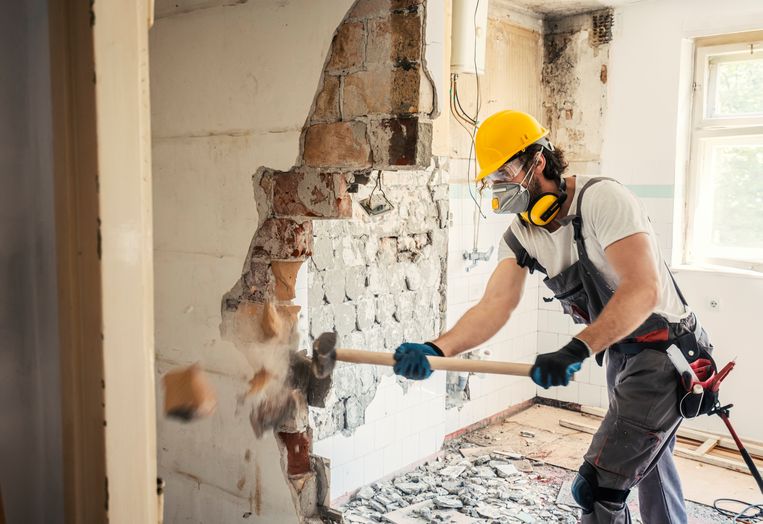Economists predict a (slight) decline in house prices. Contractors are concerned about their order books now that the new construction market has been at a standstill since borrowing became more expensive. Does this offer options for the buyer or builder? Economist Wouter Thierie and other real estate experts shed light on these questions.
Sven Ponsaerts9 september 2023, 12:00
The new construction market has come to a standstill since borrowing became more expensive. In the meantime, the government is blowing hot and cold about the extension of the reduced VAT rate for demolition and reconstruction. Uncertainty also abounds for those thinking of renovating: will VAT remain at 6 percent or will it be 9 percent?
“Such weathervane policies push both consumers and construction companies into uncertainty,” says construction federation Bouwunie. And since the renovation obligation, the real estate agent has been at a loss about the many unsellable old, energy-consuming homes. In the meantime, the customer is wondering: will house prices really fall? In short: the real estate sector is going through rough waters.
But every crisis offers opportunities. Also here? House prices will fall by an average of 3 percent this autumn before cautiously recovering in 2024, ING economists expect. “Wage indexation and an extension of loan terms have supported the real estate market so far, but not enough to compensate for the increase in interest rates.”
According to economist Wouter Thierie, significantly longer sales times indicate that a turnaround in prices is coming. A possible further slight increase in interest rates will also put additional pressure on demand.
So the question is: is it time to buy now or is it better to wait a little longer? First of all, house prices and interest rates keep each other in balance like communicating vessels, Thierie explains. A price drop is therefore associated with a higher interest rate in the long term, and vice versa.
“I therefore think that when you as a buyer feel that you are ready to take the step, it is always interesting to buy. And in that case you should not wait for better circumstances that may never arise.”
Comeback from negotiation
According to Thierie, the macro-economic situation also gives prospective buyers an asset that they could not even think about in recent years: negotiation. Where there used to be outbidding, there is now room for price negotiation again. The seller’s market is gradually becoming a buyer’s market again, where the asking price is no longer the selling price.
“Certainly for properties that have been for sale for some time, as a buyer you can try to go below the asking price. Often with success, especially in buildings that fall under the renovation obligation,” says Thierie.
For such dilapidated homes, you have to take significant renovation costs into account. However, according to the economist, such a purchase can be interesting, given the often quite large price difference with sought-after ready-to-use energy-efficient homes. “And that price difference may even increase somewhat due to the renovation obligation, whereby homes with energy label E or F must receive at least label D within five years.”
Conclusion: the prospective buyer is once again in a stronger position. Although this does not apply to the purchase of building land, the scarcity of which keeps the price high anyway, or a home with EPC label A or B.
Also good news for builders and renovators
Are there also opportunities for builders and renovators? “The new construction market is in crisis.” Nico Demeester of the Embuild construction federation makes no bones about it. “We expect a sharp decline in activities of 5 to 8 percent this year. Since interest rates on home loans tripled, the new construction market has come to a standstill. There is almost nothing, or at least far too little, in new orders. And we don’t see any improvement this year either.”
With renovations, which usually involve smaller amounts, the situation is less dramatic, according to the construction executive. “Although there is also reluctance there.”
This means there will be gaps in the planning of the contractor, who may prefer to keep his employees working. “This creates opportunities for the builder in the sense that the price can be renegotiated,” says Demeester.
Although he immediately adds nuance: don’t expect a discount of 5 or 10 percent. “The costs have continued to rise for our contractors: bricklaying, carpentry, laying pipes… it’s all manual labor. And as you know, our wage costs have also exploded due to indexation. The contractor must be given the opportunity to partly calculate this. Otherwise, he will either tear his pants and the work will not be completed, or he will simply not sign the quotation because it is unprofitable.”
According to Embuild, the result of the negotiations between contractor and private individual is more likely to be that cost increases are not passed on. “That already happens in about half of the cases, because the contractor does not want to lose the contract.”
In one way or another, there is room for negotiation again here. “Remember, we come from a time when contractors couldn’t promise when they were going to come and how much it would ultimately cost, given the explosion in material prices. Here too, we are now evolving towards a more normal situation. I think the opportunity for customers is that we can now offer them more clarity and certainty in terms of price and delivery time.”
Also read
2023-09-09 10:00:35
#homes #sale #time #successfully #price #real #estate #experts #housing #market
